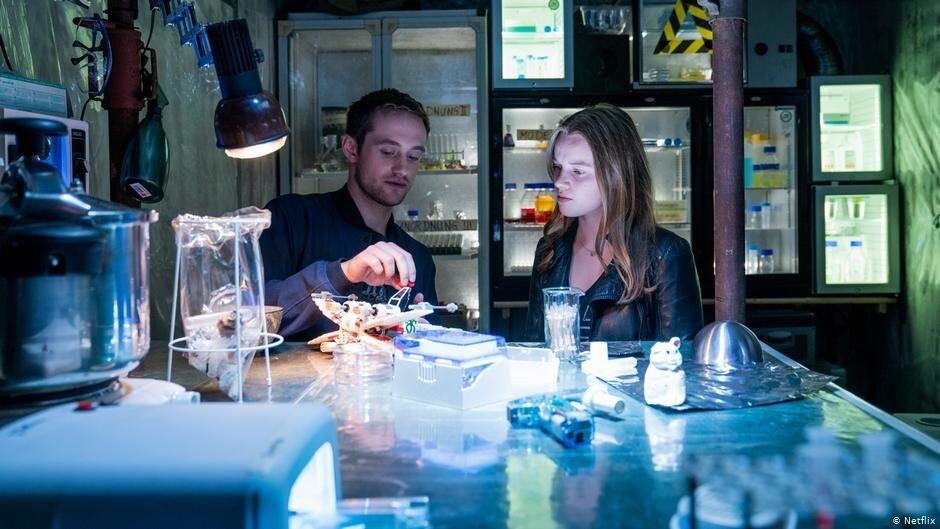The release narrative for “Biohackers”, another new German-made Netflix original production, sounds as cutting edge as it does explosive. Originally slated for March 2020, the production was abruptly postponed to late summer when corona made landfall in the “West” – the rationale being that the series could spark fears among viewers. Now “Biohackers” has been available for some time, Covid is still running riot, but any scandal has failed to materialize. Is this a bad sign? Perhaps. Let’s take a closer look.
Trouble in student paradise
“Biohackers” is set in picturesque Freiburg, a lovely city where nothing can ever really go wrong. A place where the future is conceived. A little big town that is very much under its university’s thumb – this at least is how it is perceived from the outside. A city whose municipal council is dominated by the Greens almost by tradition. Nonetheless, the mayor is a Protestant independent politician by the name of Martin Werner Walter Horn. You can’t get more of a good German feel than this, in other words. Whereas “Dark” is set in a bleaker Germany – one characterized by dark forests, nuclear power plants, and endless rain – the setting for “Biohackers” is a kind of Teutonic paradise.CRISPR in the dorm
The events leading up to the attack by this goody-two-shoes biology student are then portrayed retrospectively – and everything that now follows turns out to be far more predictable than one would ever have imagined given the dramatic beginning. Freiburg initially appears to be the cliché-ridden home to a handful of human caricatures. Alongside those already mentioned, we are introduced in the first episode to Mia’s roommates. We meet the crazy guy who uses his own body to experiment on in a bid to acquire Insta fame. Then we have the female who has far too much sex with far too many different people – but otherwise appears not to do all that much. And there is also the female who appears to have no sex at all but instead is super-smart. So far it could hardly be more simplistic and less contemporary. In the shared apartment scenes and the sequences documenting student life, “Biohackers” clearly wants to present the most clownish sitcom possible. That is something that can be done if it is done consistently.Mia in the lab
But at its heart the series is all about Mia: as we discover in further flashbacks, she has suffered some terrible experiences in her childhood and is desperate for answers. Professor Tanja Lorenz, a highly intelligent woman who out of necessity becomes manipulative, turns out to be responsible for her fate. Lorenz is depicted from the outset as an unscrupulous careerist – an early verdict that proves accurate as the series continues. Lorenz is played confidently and convincingly by Jessica Schwarz – and the battle between Mia and her is ultimately the lubricant that keeps the cogs of the series turning and makes us keep watching despite all its flaws.Im Zentrum von Biohackers stehen Genmodifikationen und ihre Folgen. Die Serie hinterfragt Ethik und Moral in wissenschaftlichen Versuchen. Wie weit kann ein Wissenschaftler gehen, um die Menschheit zu retten? Und was sind die klaren Grenzen, die man nicht überschreiten darf?
Sheena Scott für FORBES
Showrunner: Christian Ditter
Directed by: Christian Ditter (episodes 1-3), Tim Trachte (episodes 4-6)
Executive Producer: Uli Putz and Jakob Claussen, Christian Ditter, Jens Oberwetter and Jake Coburn
Written by: Christian Ditter (episodes 1-3), Nikolaus Schulz-Dornburg, Tanja Bubbel and Johanna Thalmann (episodes 4-6)
Cast: Luna Wedler, Jessica Schwarz, Adrian Julius Tillmann, Caro Cult, Thomas Prenn, Sebastian Jakob Doppelbauer, Benno Fürmann, Jing Xiang and more
Cinematography: Jakob Wiessner (episodes 1-3), Fabian Rösler (episodes 4-6)
Produced by: Claussen+Putz Filmproduktion GmbH, with funding by German Motion Picture Fund and FilmFernsehFonds Bayern







